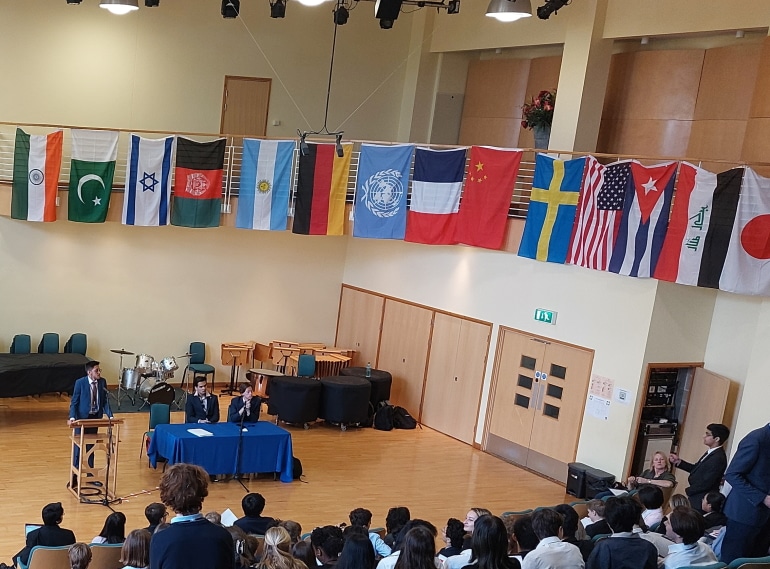
Fifteen QE sixth-formers successfully got to grips with how countries as diverse as the USA and Pakistan view the world in a Model United Nations conference.
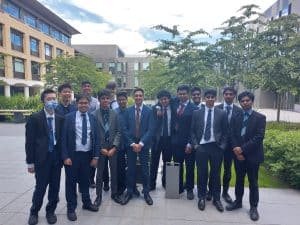 The QE Year 12 team spent weeks preparing for the annual MUN event at St Paul’s School in London.
The QE Year 12 team spent weeks preparing for the annual MUN event at St Paul’s School in London.
Model United Nations is an educational simulation of the real UN at which participants can gain greater understanding of diplomacy and international relations, as well as learning skills including research, public speaking, debating and teamwork.
Economics teacher Sheerwan O’Shea-Nejad said: “Our boys were already confident, as evidenced from their ability to lobby other delegations, but I am sure their confidence will only grow after their excellent performance.
“All the students enjoyed the experience immensely and relished the opportunity to improve their debating skills and knowledge of these important global issues. Many friendships were made and the boys hope that they will be able to attend another in-person MUN soon and are even considering hosting one next year.”
At MUN conferences, pupils are assigned as delegates to a country and participate in committees that deal with different sets of issues.
Policy proposals submitted ahead of the conference required the QE cohort to convey their countries’ plan to tackle particular global issues. Examples included: closing Guantanamo Bay; handling the tensions in the Taiwan Strait; overseas electoral rigging; nuclear testing on the moon; disarming the Taliban, and decolonising the Western Sahara. The boys had spent time researching topics and the stance they were representing.
On the first two days, the delegates engaged in some heated debate on the merits of their resolutions in separate committees, before choosing the best of them to be presented and discussed in General Assembly on the third day.
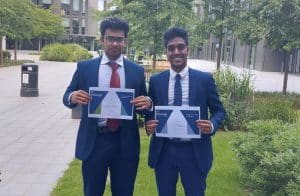 “The students debated and lobbied well, with Aryaman Madan and Nayel Muhammad Huda especially active in forming alliances with other delegations, both during committee meetings and in-between them,” said Mr O’Shea-Nejad. “Nayel was recognised as the best speaker on the Women’s Rights Committee and Abir Mohammed as the best speaker on the Legal Committee.”
“The students debated and lobbied well, with Aryaman Madan and Nayel Muhammad Huda especially active in forming alliances with other delegations, both during committee meetings and in-between them,” said Mr O’Shea-Nejad. “Nayel was recognised as the best speaker on the Women’s Rights Committee and Abir Mohammed as the best speaker on the Legal Committee.”
Reflecting afterwards, QE delegate Ryan Whorra said: “MUN was an amazing experience, due to the rich debates between all the delegates as well as learning the art of diplomacy as all delegates attempted to achieve their countries’ objectives.”
Danny Adey said: “It was a great opportunity to get a better understanding of the inner workings of international politics and meet new people.”
Mathavan Chandra-Mohan added: “It was really interesting to debate current issues with students from other schools,” Rahul Doshi that the conference was “great fun”, while at the same time the debates were “challenging”.
The QE group, with their committee, comprised:
USA: Aryaman Madan (Security), Danny Adey (Women), Ruixuan Wu (Special Political and Decolonisation Committee – SPECPOL), Rahul Doshi (Disarmament and International Security – DISEC) and Jeshvin Jesudas (Legal);
Pakistan: Abir Mohammed (Legal), Frank Zhang (DISEC) and Kai Mukherjee (SPECPOL);
Ireland: Surya Dhaka (Legal), Yash Makwana (SPECPOL) and Aarian Hundal (DISEC);
Saudi Arabia: Ryan Whorra (DISEC), Nayel Muhammad Huda (Women), Mathavan Chandra-Mohan (SPECPOL) and Mukund Soni (Legal).

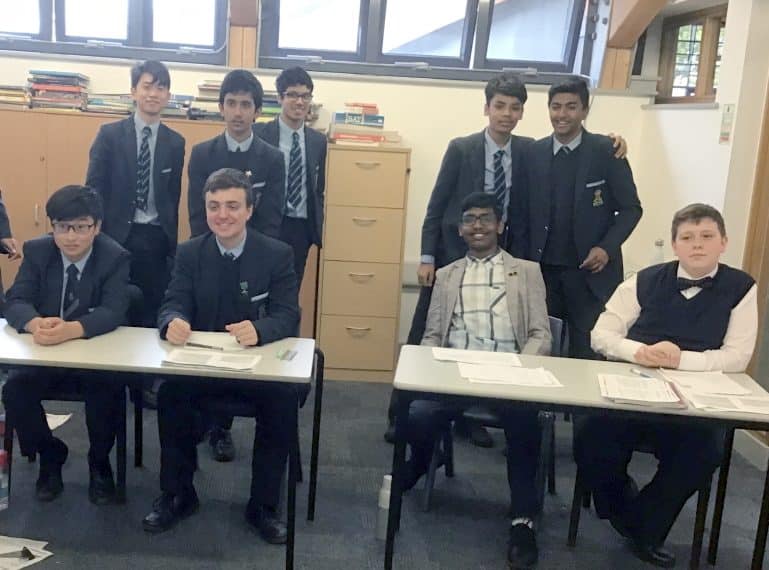
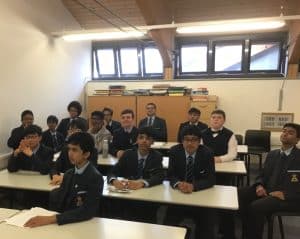 After successfully grappling with a case involving harassment across the two rounds, the defence team amassed enough points to beat all other competing schools and take the top spot. Now both QE teams will take part in a national celebration event in June.
After successfully grappling with a case involving harassment across the two rounds, the defence team amassed enough points to beat all other competing schools and take the top spot. Now both QE teams will take part in a national celebration event in June.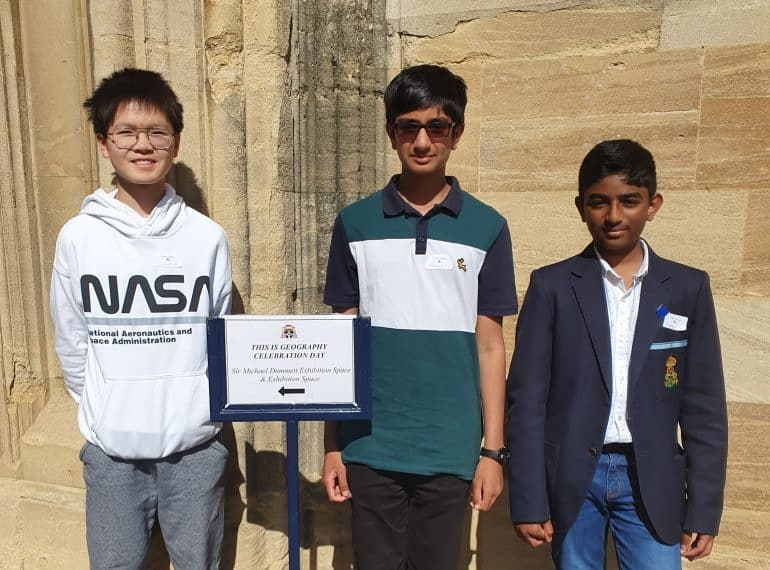
 Zhuoer Chen, of Year 9, and Sarang Nair, of Year 7, were among just ten finalists nationwide.
Zhuoer Chen, of Year 9, and Sarang Nair, of Year 7, were among just ten finalists nationwide.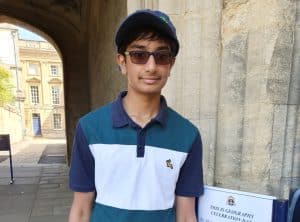 The competition, which is part of Christ Church’s outreach work, was open to all UK state school pupils in Years 7–10. Entrants had to submit a video 2–5 minutes long on a geographical issue or phenomenon that was local to them.
The competition, which is part of Christ Church’s outreach work, was open to all UK state school pupils in Years 7–10. Entrants had to submit a video 2–5 minutes long on a geographical issue or phenomenon that was local to them. The video compared average yearly temperatures at Greenwich weather station with those at Calgary and found they were 11.35C higher.
The video compared average yearly temperatures at Greenwich weather station with those at Calgary and found they were 11.35C higher.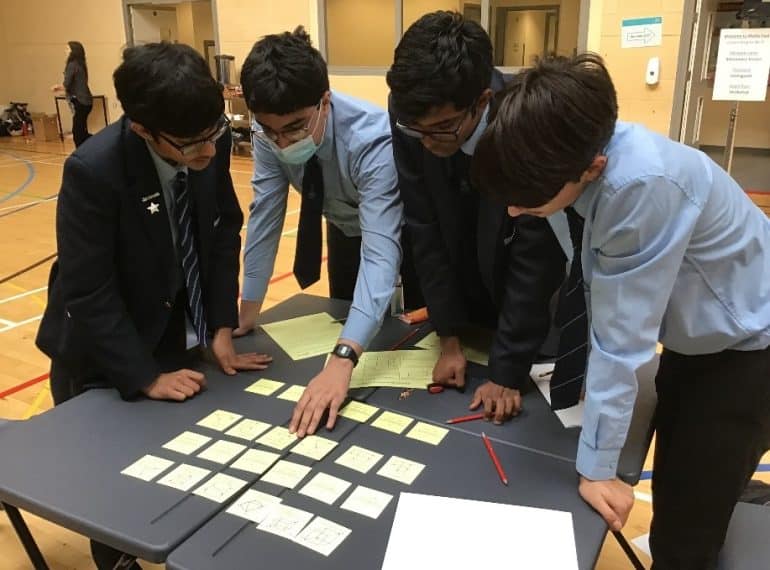
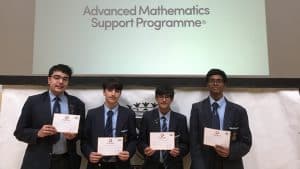 After being selected to represent the School in the event, the four emerged with a perfect score of 121 out of 121.
After being selected to represent the School in the event, the four emerged with a perfect score of 121 out of 121. Hadi Al-Esia, Kovid Gothi, Saim Khan and Shreyaas Sandeep travelled to St Dominic’s Sixth Form College in Harrow on the Hill for the competition run by Advanced Mathematics Support Programme – a Government-funded national initiative.
Hadi Al-Esia, Kovid Gothi, Saim Khan and Shreyaas Sandeep travelled to St Dominic’s Sixth Form College in Harrow on the Hill for the competition run by Advanced Mathematics Support Programme – a Government-funded national initiative. Card Sort: Competitors had to reimagine every 3D shape (such as cubes) to try to unravel the shortest way to pass through or over them. “This was by far the most challenging round for the team to tackle as it involved a new dimension of geometry for them – a combination of Pythagoras and 3D visualisation,” Mr Shah added. “They finished the round with less than 20 seconds to spare.” The team’s favourite problem came from this round (see picture right): competitors were asked to calculate the distance from A to B if the net [what a 3D shape looks like if opened out flat] were open for the cone.Saim said: I particularly enjoyed the card sort round – trying to reimagine and visualise the shapes in a new way was challenging but immensely rewarding too!”
Card Sort: Competitors had to reimagine every 3D shape (such as cubes) to try to unravel the shortest way to pass through or over them. “This was by far the most challenging round for the team to tackle as it involved a new dimension of geometry for them – a combination of Pythagoras and 3D visualisation,” Mr Shah added. “They finished the round with less than 20 seconds to spare.” The team’s favourite problem came from this round (see picture right): competitors were asked to calculate the distance from A to B if the net [what a 3D shape looks like if opened out flat] were open for the cone.Saim said: I particularly enjoyed the card sort round – trying to reimagine and visualise the shapes in a new way was challenging but immensely rewarding too!”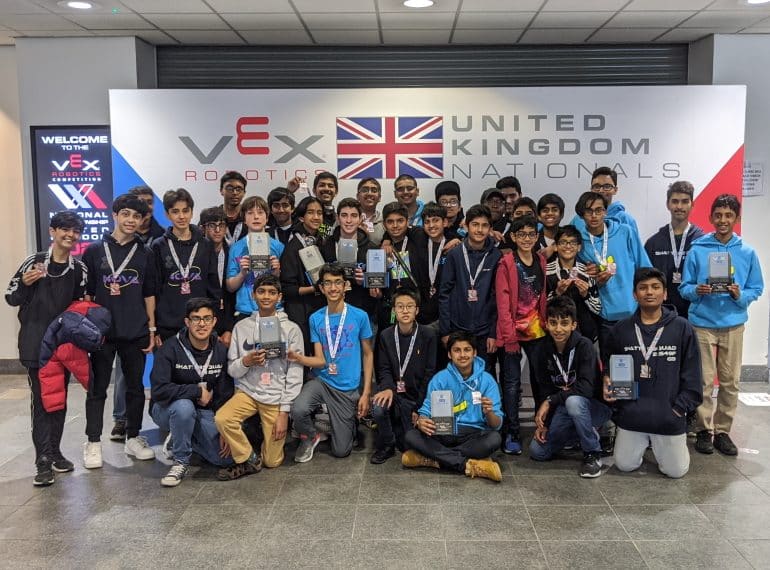
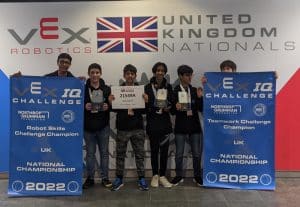 The six junior teams also won a slew of the top awards, following in the footsteps of the senior VRC teams who had similarly taken awards in their competition over the previous two days.
The six junior teams also won a slew of the top awards, following in the footsteps of the senior VRC teams who had similarly taken awards in their competition over the previous two days.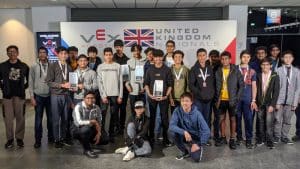 Four teams – two from Year 10, one from Year 12 and one with a mix of boys from the two year groups – competed in the senior VRC bracket at Telford International Center. HYBRID, Vortex Invicta, HEX Green and Hyperion pitted their wits against the very finest robotic talent in the UK. The VRC championships drew 58 teams from all over the UK to battle it out in the competition’s Brunel and Lovelace divisions.
Four teams – two from Year 10, one from Year 12 and one with a mix of boys from the two year groups – competed in the senior VRC bracket at Telford International Center. HYBRID, Vortex Invicta, HEX Green and Hyperion pitted their wits against the very finest robotic talent in the UK. The VRC championships drew 58 teams from all over the UK to battle it out in the competition’s Brunel and Lovelace divisions.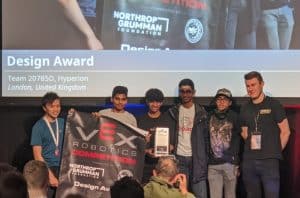 “Hyperion reached the Brunel divisional finals, while an all-QE alliance of HEX Green and HYBRID made it to the Lovelace division semi-final, only to be cruelly denied a finals place by a loose battery connection. The day was not over for QE teams, however: when the medal winners were announced, Hyperion won the coveted Design Award (considered the second-most prestigious in the whole competition), HEX Green achieved double success, winning both the Skills and Think awards, and Vortex Invicta received a Judges Award. “Vortex Invicta’s first award of the season thus arrived at the highest level of competition they had so far faced!” Mr Noonan said.
“Hyperion reached the Brunel divisional finals, while an all-QE alliance of HEX Green and HYBRID made it to the Lovelace division semi-final, only to be cruelly denied a finals place by a loose battery connection. The day was not over for QE teams, however: when the medal winners were announced, Hyperion won the coveted Design Award (considered the second-most prestigious in the whole competition), HEX Green achieved double success, winning both the Skills and Think awards, and Vortex Invicta received a Judges Award. “Vortex Invicta’s first award of the season thus arrived at the highest level of competition they had so far faced!” Mr Noonan said.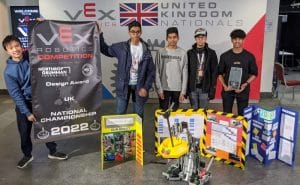 The achievements began with Gearsquad posting an early National Record Skills score. After strong QE performances in the Qualification and Skills elements of the competition, all eyes turned to the finals. The alliances (15 pairs from the 30 teams taken part) faced off in reverse order, from lowest to highest ranked, and the ‘Chair of Champions’ was unveiled – a seat reserved for the (current) highest-ranked teams.
The achievements began with Gearsquad posting an early National Record Skills score. After strong QE performances in the Qualification and Skills elements of the competition, all eyes turned to the finals. The alliances (15 pairs from the 30 teams taken part) faced off in reverse order, from lowest to highest ranked, and the ‘Chair of Champions’ was unveiled – a seat reserved for the (current) highest-ranked teams.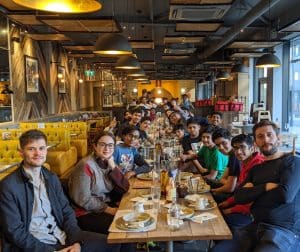 They also gained the following awards:
They also gained the following awards: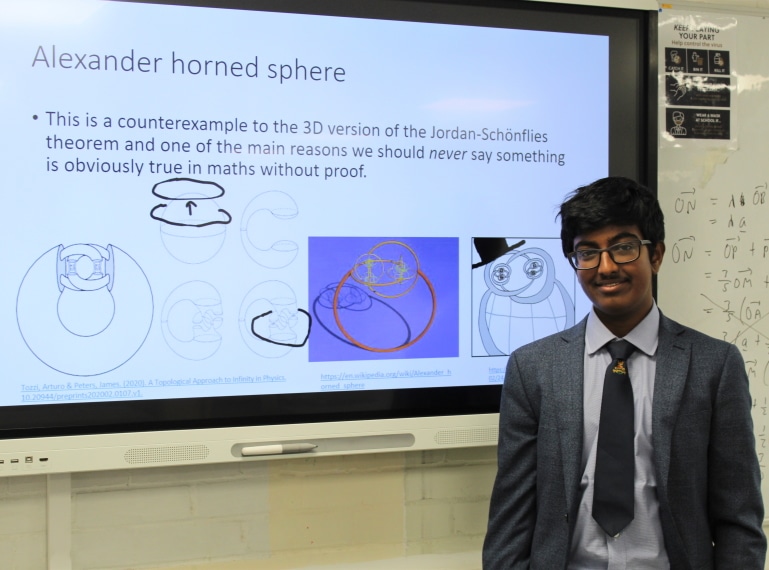
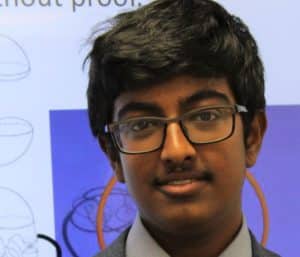 Shankar was among 45 Year 12 mathematicians from QE to attend the annual series of lectures at The Royal Institution in London.
Shankar was among 45 Year 12 mathematicians from QE to attend the annual series of lectures at The Royal Institution in London.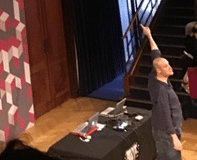 Puzzle expert and author Rob Eastaway looked at ‘fairness’ and ‘guilt’, telling the audience that chimpanzees have been seen to grasp the concept of fairness, refusing a treat if they felt they were receiving preferential treatment over their fellow chimps.
Puzzle expert and author Rob Eastaway looked at ‘fairness’ and ‘guilt’, telling the audience that chimpanzees have been seen to grasp the concept of fairness, refusing a treat if they felt they were receiving preferential treatment over their fellow chimps.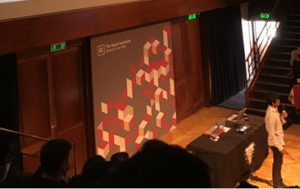 During breaks, the boys visited the event’s Maths Village, where they could enjoy mini-mathematical activities and meet people who use Mathematics every day at university and in commerce.
During breaks, the boys visited the event’s Maths Village, where they could enjoy mini-mathematical activities and meet people who use Mathematics every day at university and in commerce.